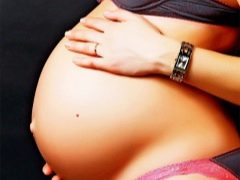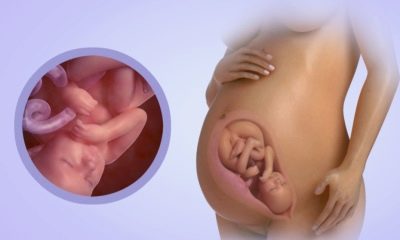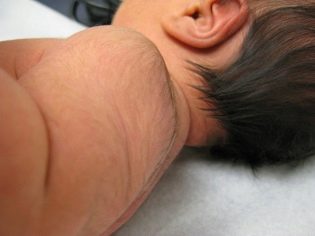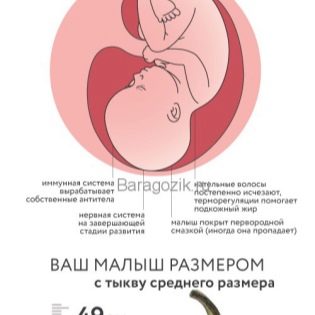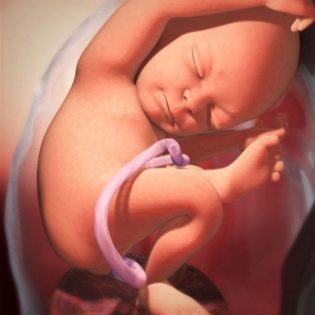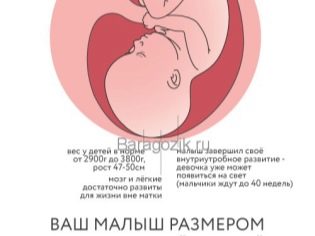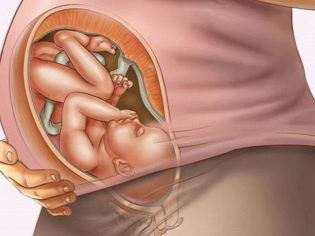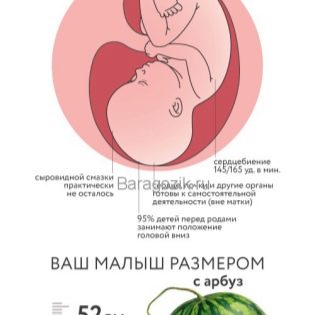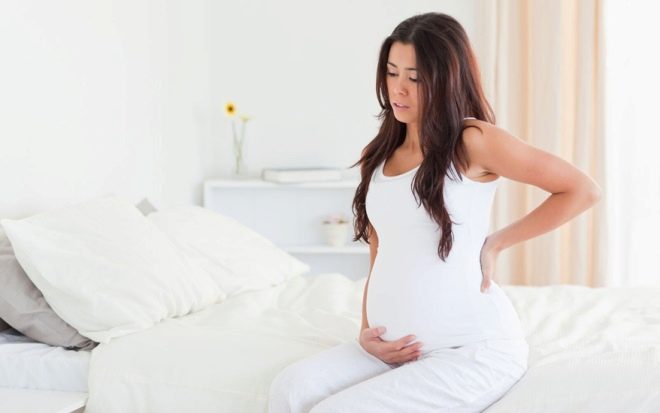Ninth month of pregnancy
The last month of pregnancy has begun. It will be one of the most difficult, because the child is big and mother becomes difficult to wear it under her heart. Everything is literally saturated with impatient anticipation - parents, relatives, family friends and a prepared children's room are waiting for the baby to appear. If she is not ready yet, it's time to finish the preparations.
Special features
The ninth month of pregnancy closes the last, third trimester. Births can occur on any given day, since the estimated date (the same DA) accounts for only about 5% of all births, the rest occur from week 38 to week 42 Anytime.
The month includes several final obstetric weeks: 36, 37, 38, 39 and 40 weeks. Starting from the 37th week of pregnancy, childbirth is considered urgent, and the child will not be premature.
Fetal development
From the beginning of 9 months, the baby begins large-scale preparations for the upcoming birth. For him, this process will also be a serious test, because passing through the birth canal is not at all such an easy task as it may seem. The processes that are now taking place in the children's organism will contribute to its adaptation to the new habitat after birth: to a new type of breathing, to the absence of an aquatic environment, to a different temperature, and also to the abundance of microbes and viruses that inhabit our world.
The babies go down below and press their head against the exit of the uterus. This is their pre-launch position. The pressure of the head on the inner throat of the cervix stimulates its maturation and opening, brings the moment of birth closer. However, it is easier for the mother to breathe, because the uterus presses on the diaphragm not so much, the heartburn disappears, but urination becomes more frequent.
The child groups, presses his chin to his chest, folds his arms, presses his legs, and in this position he is to begin to be born when he has time. It is worth considering some of the features of each week of the ninth month of pregnancy.
36 week
At this period, the baby reaches a weight of 3 kilograms. We are talking about the average baby, because now all the crumbs are very different: there are large ones, the weight of which has exceeded 3 kilograms, there are miniature ones, whose weight is within 2.7 kilograms. Both are normal if the child does not have hypotrophy, and his lungs have matured to a sufficient degree. These two factors will ensure his survival in the case of birth right now. Children also grew up in different ways, the average height at this time is 46-49 centimeters.
Most children no longer have lanugo (thin hair on the skin of the body), cheese-like lubricant is preserved only in skin folds, where mechanical friction is possible: inguinal folds, popliteal, elbow and neck fold. If lanugo is still partially preserved, there is nothing pathological about it - even if the baby is born fluffy, the hair will fall out during the first weeks of life.
Neither treat nor contribute to this.
All the bones of the child have become strong, dense, stored enough calcium. Only the bones of the skull remain mobile and soft., but it should be so - the baby will have to go forward through the narrow birth canal, and if the bones are too strong and cannot adjust to the situation, then the baby can get stuck.
At this time, children have a luxurious manicure - the nail plate for the first time during the period of intrauterine development begins to protrude beyond the limits of the phalanges. A child, if he is born now, will still be prematurely, but the degree of prematurity will be defined as the lightest, not requiring most resuscitation.
37 week
From this week, the fetus begins to add 40-50 grams per day. The adjustment of the sense organs begins - the sensors will have to do a great job of launching the adaptation mechanisms of the brain after the baby is born. Everything is ready for this in his body.
The lung tissue of most babies is mature.able to provide normal independent breathing. A newborn on this period will not be considered premature, and now it looks like a newborn. The baby moves little - the uterus becomes too crowded for active movement, but often hiccups - it is believed that children rehearse the respiratory reflex, which is already fully formed, and also “tune up” the digestive system - food will soon flow not through blood, but through the esophagus .
Children sleep a lot, see dreams. What they are dreaming of, medicine is not known for certain, but research has shown that REM sleep prevails, which made it possible to make a conclusion about dreams.
38 week
About a third of women give birth this week. This is a normal, urgent delivery, which does not cause fear among doctors and should not frighten a woman. The child is heavy on average, children now weigh from 3.3 to 3.6 kilograms with growth of 50-52 centimeters.
At this time only 2% of boys did not have testicles in the scrotum, but there is still time. Amniotic water has become even smaller, which gives the woman an unforgettable experience - even rare, but very significant shocks and kicks from the inside. The pose in which the child is in the womb is final.
And if the baby has not turned its head down, the doctors are trying to perform a cesarean section in order to reduce the risks of birth injuries for the crumbs and his mother.
39 week
This week, the vast majority of pregnant women give birth. The child is fully prepared for life outside the womb, it remains to wait for the readiness of the maternal organism. Scarce diligently helps mom: the placenta produces oxytocin, which, having accumulated in sufficient concentration, forms a generic dominant and stimulates contractions and uterine contractions. If the cervix is immature, hospitalization may be offered to the woman during this period in order to prepare the cervix for the opening and birth of the baby in the hospital.
Most of the planned cesarean section, for which the woman has medical indications, is carried out just this week in order not to wait for the independent onset of labor.
40 week
While mother is suffering while waiting for the day of childbirth, the baby suffers from crowding. It is very difficult for him to move, the walls of the uterus quite tightly cover the fetal bladder, in which very little water remains. The placenta is rapidly aging and loses its function, in connection with which oxygen starvation of the baby may occur. In most cases, the child's body is already strong enough to activate the compensatory mechanisms and help the child wait, under difficult conditions, for the rest of his life until the birth.
Since the child is cramped, he is experiencing some stress, and therefore in a small children's body produces stress hormone - adrenaline. Now he is also helping mom. Adrenaline increases the production of oxytocin, and my mother's body begins to more intensively prepare for childbirth.
Woman's well-being
The ninth month for the future mother is filled not only with various sensations of all shades and nuances, but also with anxious expectation. Bags in the maternity hospital are collected and stand in the most prominent place, the phone is always charged and at hand. Now it is better not to go far from home, but going out do not forget to put in your purse passport and exchange card - childbirth can begin anywhere and somehow. Having documents with you will make it much easier to get into your chosen hospital in advance.
Stirrings
The movements of the child become rare, but their rate remains the same - at least ten episodes of activity in 12 hours. Now it is important to track the movements and their character with great attention. A slowdown can be a sign of a severe and uncompensated state, the suffering of a child, and abrupt and frequent movements, painful for the mother, may indicate that hypoxia has just begun.
In both cases, you need to go to the doctor as soon as possible.
Often women notice that closer to childbirth, the movements almost completely disappear and regard it as a harbinger of childbirth. But you should be prudent. Consultation doctor does not hurt.
Stomach
The uterus reaches its height. It is located almost on the area of the entire abdominal area, which causes restraint and dysfunction of other organs - pressure on the bladder leads to frequent urination, while the leakage of urine can provoke a cough, and laughter. Pressure on the bile ducts leads to diarrhea, and on the intestines and lower veins - to varicose veins, constipation and hemorrhoids.
A small belly does not mean that in the womb a small fetus, the baby can be located with the little face and arms and legs towards the mother’s intestines, and then the stomachs really look much neater. Most of them have little stomachs at the end of the third trimester.
Back aches due to the huge and heavy uterus and the pressure of the fetus, it hurts loin due to the displaced center of gravity, it hurts legs, knees. Feelings are not the most pleasant, but quite understandable. The preparation of the cervix, its softening and opening may be accompanied by a feeling that women describe as "tingling inside."
Psychological state
The hormonal background is changing rapidly. Estrogens, relaxin, oxytocin and prolactin replace progesterone. This burning “cocktail” ultimately starts the generic process, but previously, during the preparation of the body for this important moment, it affects the mental state - the woman becomes very anxious, vulnerable, whiny. Therefore, family scandals and scenes in the last month are not uncommon.
A woman needs a special relationship of relatives and a husband, she needs attention and participation. Without getting them, she becomes irritable. Hormonal background and stress leave their imprint on the nature of sleep - very often in the last month there is insomnia. Violation of night sleep is associated with the inconvenience of side-to-side coups.
The left and right side are the only acceptable and possible postures for sleeping shortly before birth.
Weight gain
A woman's body begins to get rid of excess fluid, which progesterone accumulated diligently “for a rainy day”. therefore weight may decreaseusually lose 2-3 pounds by the end of the month. It becomes easier to placenta, in the fetal bladder less water, all this, one way or another, affects the fact that the woman becomes easier.
Pathological weight gain during this period may indicate gestosis. When it does not necessarily have external swelling (swelling of the legs, arms, face), sometimes late toxicosis is manifested by internal swelling, which is even more dangerous. That is why now you need as little as possible to eat salt, and as often as possible weighed. Despite the weight loss, the skin is stretched to the limit, therefore in the abdomen and mammary glands may be pronounced itching.
Pubic bone
Many future mothers on this period hurt the pelvic bones - they diverge under the action of relaxin, a hormone that softens the ligaments and bones of the pelvis. Such a mechanism invented by the wise nature is not accidental - it will help to have a baby easier. But now it is important to ensure that the pain was moderate. If it becomes impossible to walk, stand, sit, roll over, you should inform your doctor.
It is not excluded that takes place symphysitis, and in that case, they may order a cesarean section to prevent injury to the bones of the pelvic woman. "Backache" in the pelvis and pelvic bones, which sometimes happen - a sign of squeezing is already a big kid nerve endings.
Allotment
Discharge from the genital tract becomes a little more than before, and now you need to be very careful about them. Normal is considered a selection. light, transparent, no impurities. Brown can talk about problems with the placenta, green - about the infection, white with itching and the smell of yeast - about thrush. Any abnormal discharge is a reason for an immediate visit to the doctor. All infections and malfunctions must be treated before the onset of labor, so that there is no risk of infecting the baby as it passes through the birth canal.
The separation of mucus parts or a large clot with blood or brown streaks - discharge of mucus plug, which closed the cervical canal throughout the entire period of carrying the baby. This is a sign that the birth is already approaching. The presence of watery discharge may well be a leakage of amniotic fluid.
A woman needs to go to a doctor right away to get a referral for hospitalization.
Other problems
Among the common problems of the last month - cystitis and hemorrhoids. In both cases, the woman can already receive treatment, since the effect of the medicine on the fetus is no longer as dangerous as it was before. Shortly before giving birth, women are increasingly pulling the lower abdomen, the uterus tingles - you just need to get used to it and accept it as inevitable. Dizziness is associated with a large amount of blood circulating in the body of a pregnant woman. If dizzy, it is important to control the level of blood pressure and try not to leave one of the houses.
The tone of the uterus, which arises from time to time, is training contractions. As the birth approaches, they become more frequent and stronger. A runny nose may have a physiological origin - swelling of the mucous membranes characteristic of many expectant mothers. After childbirth such a runny nose passes during the day.
When to go to the hospital?
This is the main question that worries the future mother. If a woman gives birth for the first time, she is doubly afraid to overlook and miss the signs of advancing childbirth. Calm down right away - it’s impossible to see this in principle. Here is a list of situations in which you should go to the maternity hospital.:
- rhythmic contractions of the uterus began (the uterus stiffens, the lower back catches and releases about once every 10 minutes) - these are full labor contractions, you can safely go to give birth;
- water departed (immediately or in parts) - we do not wait for fights and go to the hospital;
- there were bleeding - do not wait for water or fights, call an ambulance and go to the maternity hospital.
Today, there are many applications for the smartphone, which will help to count the contractions at the slightest suspicion that the birth has begun. But you shouldn’t fully rely on them - measure the time and regularity on your own, with the help of an ordinary watch with a stopwatch. When you call the ambulance please inform:
- Your age;
- gestational age;
- symptoms: frequency of contractions, the duration of each;
- the color and approximate amount of amniotic fluid, if they have moved;
- what kind of childbirth.
This will help physicians to quickly navigate to what stage of birth you are, and more likely to take you to the obstetric institution.
Recommendations
The generic process depends on the behavior of women in the last month: anxiety, stress, and fear increase the physical muscle clamps on the physical level, and therefore the maturation of the cervix slows down, it becomes difficult to open, the delivery takes longer and is painful. Properly prepare for childbirth help The following recommendations:
- Practice breathing and muscle exercises recommended in the methods “Births without pain and fear”, so that you can start using them from the very beginning of the birth process;
- move more, walk, do your best work around the house - this contributes to the maturation of the cervix.
Traveling by air is no longer recommended - pressure drops can trigger the onset of labor right on board an aircraft. But sex is not prohibited, but only under the condition that there are no complications of pregnancy. In case of multiple pregnancies, IVF pregnancies, any complications, as well as after the discharge of the plug and leakage of water, sex is prohibited.
When prolonging pregnancy, sex is often recommended, since the sperm contains natural prostaglandins that help soften the cervix, and the orgasm may well start the birth process. But here there are the above limitations.
Important! After the discharge of the cork can not take a bath - you can only take a shower while standing.
Consider a few more useful tips.
- It is possible to treat teeth, but with great care. If it is possible to postpone dental procedures, it is better to transfer them to the postpartum period.
- Temperature, acute respiratory viral infections, colds, chickenpox, flu are no longer dangerous for the child, but can complicate the situation of the mother - with signs of the disease in the maternity hospital put only in the observational department (infectious).
- Try not to eat foods with high allergenicity in recent weeks, so as not to provoke a tendency to allergies in a child - mandarins, oranges and seafood can not be eaten now. Medium allergenic products should be limited to a minimum.
- Alcohol (even champagne and beer) is prohibited, as is coffee. They can stimulate the onset of labor when the cervix is not fully ripe, which can lead to injury to the birth canal and the baby. You can drink only clean drinking water and herbal tea.
- It is not recommended to dye hair, perm, grow nails last month - the placenta is already too thin and may not contain toxic substances contained in hair dyes, solutions and products for manicure.
The main thing is not to rush childbirth.
Everything has to happen in due time. Attempts to call them at home can be very dangerous.
